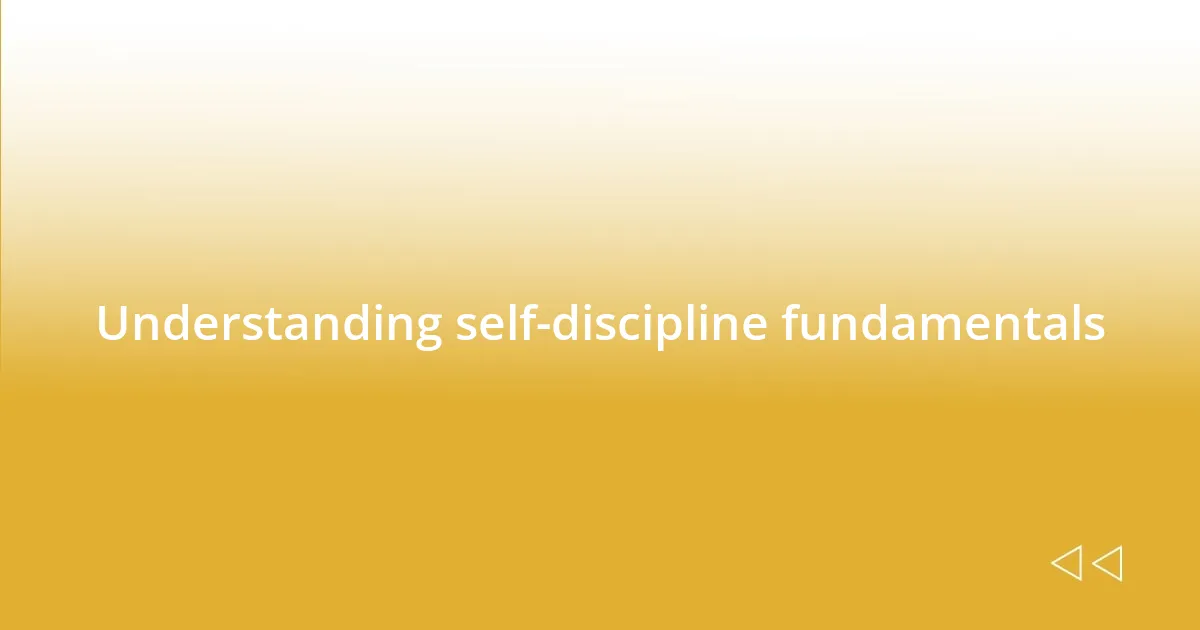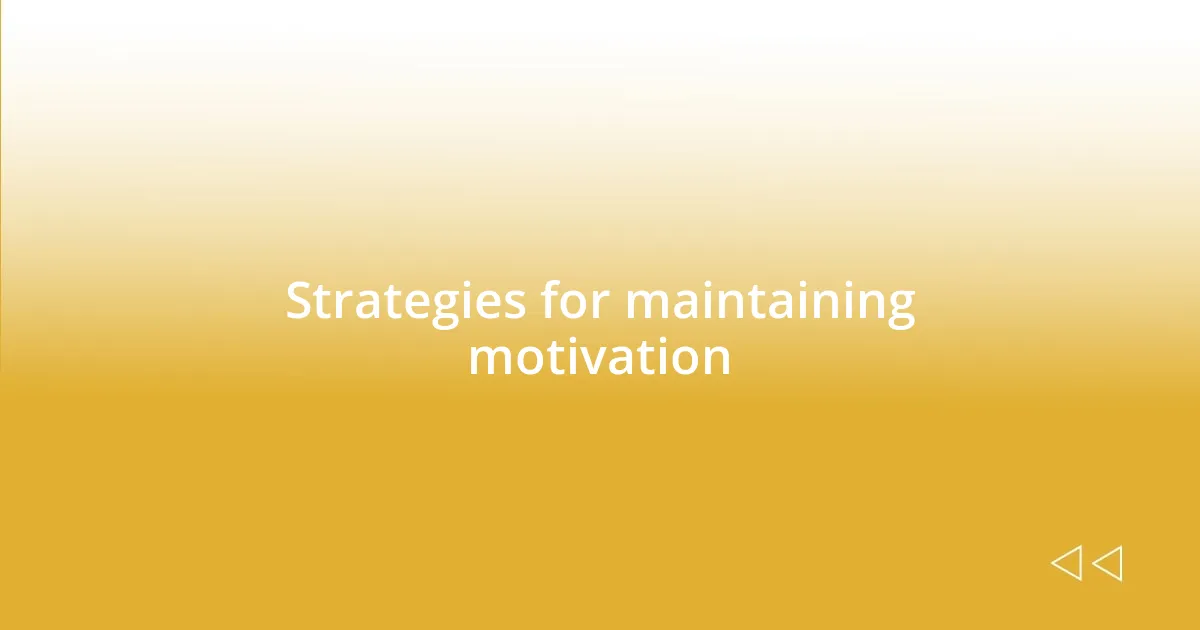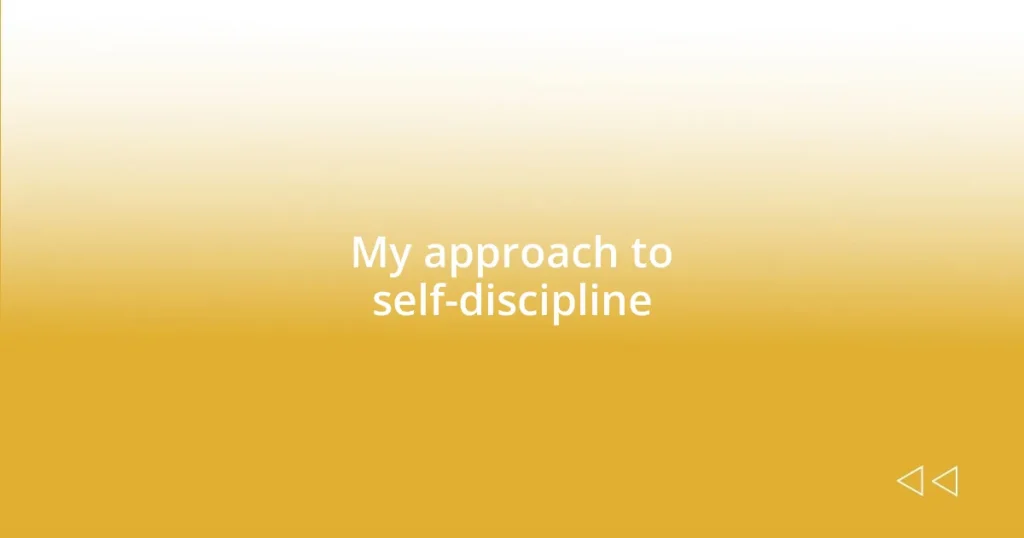Key takeaways:
- Self-discipline is more than willpower; it involves creating a supportive environment and setting clear, achievable goals.
- Identifying personal emotional triggers and obstacles is crucial for maintaining discipline and can lead to transformative changes.
- Building daily habits should focus on consistency, tracking progress, and celebrating small wins to maintain motivation.
- Regularly evaluating progress and adjusting strategies enhances self-discipline, allowing for flexibility and renewed enthusiasm in pursuing goals.

Understanding self-discipline fundamentals
Self-discipline is often misunderstood as sheer willpower, but it’s actually much more nuanced. I remember a time when I tried to quit snacking after dinner—initially, I relied solely on willpower, only to find myself bingeing later. It taught me that self-discipline involves creating an environment that supports our goals, not just forcing ourselves not to do something.
One of the core fundamentals of self-discipline is setting clear and achievable goals. When I first embarked on my fitness journey, I made the mistake of aiming for ultra-strict routines that quickly became overwhelming. But when I shifted to smaller, attainable milestones—like walking for just 15 minutes a day—I found that each small victory fueled my motivation. This gradual approach not only reinforced my self-discipline but also transformed my perspective on progress.
Another crucial element is understanding the emotional triggers that can sidetrack us. For instance, I often realize that stress makes me more susceptible to procrastination. By recognizing this pattern, I’ve learned to implement stress-management techniques, such as deep breathing or quick meditation, which help me refocus and maintain my discipline. How often do we overlook our emotional landscape when trying to be disciplined? Taking the time to reflect on these feelings can significantly deepen our commitment to our goals.

Benefits of self-discipline in life
Self-discipline brings a wealth of benefits to our lives. From personal experience, I’ve discovered that establishing self-discipline has notably increased my productivity. When I started setting specific times for my tasks, I found that I accomplished more in less time, leaving me with moments to relax and enjoy guilt-free. Can you imagine how liberating it feels to finish work early and still have time for hobbies?
Another profound benefit I’ve noticed is the sense of empowerment that comes with self-discipline. It’s amazing how sticking to my commitments—even when it’s tough—creates a ripple effect of confidence in other areas of my life. For example, after consistently waking up early to exercise, I felt more motivated to tackle challenging work projects. Suddenly, those hurdles seemed less daunting, and I was ready to seize new opportunities.
Finally, self-discipline nurtures resilience. Life throws curveballs at us all, and how we respond to those challenges often hinges on our ability to stay focused and maintain our commitments. I recall a time when unexpected work demands threatened my regular workout schedule. Instead of abandoning my goal, I adapted and figured out shorter, high-intensity workouts that fit my new time constraints. This experience not only taught me about flexibility but also reinforced my belief in the power of perseverance.
| Benefit | Description |
|---|---|
| Increased Productivity | Establishing a routine allows for more efficient use of time, leaving space for relaxation and personal pursuits. |
| Boosted Confidence | Sticking to commitments builds self-assuredness, enabling us to tackle challenges and seize opportunities. |
| Enhanced Resilience | Self-discipline empowers us to adapt to changes and overcome obstacles, strengthening our tenacity. |

Identifying personal triggers and obstacles
Identifying personal triggers and obstacles is key to mastering self-discipline. I still remember the day I realized that late-night TV was a trigger for my overeating; it was a classic ‘just one more episode’ scenario. Recognizing that was a game-changer for me. By pinpointing what derailed my focus, I learned to create boundaries. Now, I reserve evenings for reading or journaling, steering clear of temptations.
To better understand your own triggers and obstacles, consider these insightful points:
- Stress Response: Identify how stress manifests for you. Is it in seeking comfort food, endless scrolling on social media, or putting off tasks?
- Environmental Cues: Become aware of your surroundings. Do certain places or people influence your self-discipline negatively?
- Emotional Patterns: Reflect on your emotional triggers. What feelings prompt you to act against your goals?
- Routine Disruptions: Notice moments when your routine is thrown off. What adjustments can you make to keep on track?
- Accountability Gaps: Recognize who or what holds you accountable. Are there gaps that need to be filled to reinforce your commitment?
By getting to the heart of these triggers, you empower yourself to make choices that align with your goals. This process isn’t just insightful; it’s transformative.

Setting actionable discipline goals
Setting actionable discipline goals requires clarity and specificity. I’ve found that vague goals often lead to disappointment, so I focus on making my targets as clear as day. For instance, instead of saying “I want to exercise more,” I’ll set a goal like “I will run for 30 minutes every Monday, Wednesday, and Friday.” This way, I know exactly what I’m aiming for.
When I first started this approach, I remember feeling a bit overwhelmed. However, breaking larger goals into smaller, manageable steps helped tremendously. I began by committing to just ten minutes of stretching every day before ramping up my routine. Have you ever felt the weight of a big goal? It’s daunting! Simplifying my targets eased that pressure and made progress feel truly attainable.
Lastly, I’ve come to understand the importance of flexibility within my goals. Life can be unpredictable, and rigidity often leads to frustration. I learned to adjust my goals when necessary without perceiving it as failure. For example, when an unexpected work deadline arose, instead of scrapping my exercise routine altogether, I’d switch to doing shorter, more intense workouts. It’s all about maintaining forward momentum, even when the path shifts unexpectedly. Isn’t it empowering to adapt rather than abandon your goals?

Techniques for building daily habits
Building daily habits is all about consistency and finding what resonates with you. I remember when I first tried the concept of habit stacking: attaching a new habit I wanted to develop to an existing one. For example, after my morning coffee, I would spend five minutes meditating. It’s surprisingly effective! Have you tried linking habits? You might find that when you integrate tasks into your routine, they flow more naturally.
Another technique that I swear by is the two-minute rule. If a habit can be done in two minutes or less—like doing a quick set of push-ups or writing a couple of lines in a journal—just do it right away. I still recall the rush I felt when I adopted this approach; it felt like a small victory each time. This simple shift not only makes tasks feel less daunting but also builds a sense of achievement. What little steps have you taken that made a difference?
Finally, tracking your habits can be a game-changer. I love using a habit tracker app that visually showcases my progress. It sparks joy to see those little checkmarks accumulate! It’s almost like a fun video game. How gratifying would it feel to look back and realize how far you’ve come? Just remember, the key is to celebrate those small wins—they can keep you motivated on your journey toward self-discipline.

Strategies for maintaining motivation
Maintaining motivation can sometimes feel like a roller coaster ride, with ups and downs that challenge your resolve. I’ve found that surrounding myself with encouraging influences makes a huge difference. For instance, when I faced a tough week, I reached out to friends who share similar goals. Listening to their stories and struggles reminded me that I wasn’t in this alone. It’s amazing how a simple conversation can reignite your passion, isn’t it?
Another tactic I’ve embraced is visualizing my end goals. Every morning, I spend a few minutes picturing what success looks like for me. This could be anything from imagining how great I’ll feel after completing a workout to visualizing the satisfaction of finishing a project. It gives me a mental boost that carries me through the day. Have you ever paused to really see your future? Taking that moment to dream has a way of positioning ambition right in front of you.
Lastly, I’ve discovered that tracking progress in a tangible way keeps my motivation alive. Whether it’s checking off tasks on a to-do list or using an app to monitor my journey, seeing those small victories really makes me feel accomplished. I once started keeping a journal, and it turned into a delightful ritual. It felt like documenting my personal journey, with all its peaks and valleys. What methods have you tried to visualize your progress? You might surprise yourself with how much motivation a little tracking can generate!

Evaluating progress and adjusting strategies
Evaluating your progress is a crucial step in self-discipline. I can’t stress enough how important it is to take a moment—maybe at the end of the week—to reflect on what you’ve accomplished and what might need tweaking. I remember when I set a goal to read more; after a month, I realized I wasn’t enjoying the process. Instead of pushing through a book I wasn’t into, I decided to change my approach and switch to audiobooks. It was a small adjustment, but it reignited my enthusiasm.
As you assess your progress, don’t hesitate to ask yourself tough questions. What strategies worked brilliantly? Which ones fell flat? I’ve had weeks where I meticulously planned every minute but ended up feeling overwhelmed. When I took a step back to analyze the chaos, I learned to prioritize quality over quantity, allowing myself the grace to simplify my pursuits. Have you ever had a similar experience where a minor change led to a major difference?
Adjusting your strategies based on your evaluations is like an artist revising a painting—it enhances the final masterpiece. I once held on to a rigid workout schedule, thinking consistency was key, but I often dreaded my exercise routine. After evaluating my feelings, I allowed myself to explore different activities—yoga, hiking, dancing—and found joy again. It transformed my approach to fitness. Consider this: how flexible are you when it comes to tweaking your methods? Embracing change can open up a world of possibilities!















